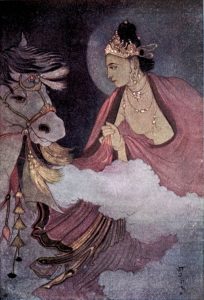How might I attain inner peace?
For most of us, life can be a quest for materialism in order to quench the thirst of our desires. Predominantly, through marketing, society has led us to believe that the anguish that we feel may be overcome by some ‘thing’, rather than the immaterial realization that what we are seeking may not be tangible at all.
Such is also the case for Siddhartha; the son of a respected Brahmin who lived in Ancient India and was expected to follow in his father’s footsteps one day. Though his life was surrounded by pleasure, and his every desire was promptly met, he still could not overcome his longing for “something more”.
Haven’t we all felt like that at some point in our lives?
One day, a wandering group of ascetic monks passed by Siddhartha. Starving and naked, they were attempting to pursue enlightenment through renunciation. For them, every pleasure was an evil which took them further away from the inner peace of enlightenment. Astounded by this new path, Siddhartha decided to follow them in order to see if they held the answers he was looking for.
Starving himself, abstaining from decadence, and learning how to go without clothes, Siddhartha soon became one of their most adept pupils. But eventually, sunburned and starved, renouncing all that the world had to offer, Siddhartha came to learn that the oldest of the ascetics still had yet to find the inner peace of enlightenment that they were all looking for. He then heard of a new holy man, ‘Gotama the Buddha’, who had achieved a state of enlightenment that he called ‘Nirvana’. Naturally, due to his curious and inquisitive nature, Siddhartha decided to leave the ascetics in search of this ‘Buddha’.

Often times, when faced with new information, we must be willing to cut out the old and move forward into the new. That is the only way for true progress to occur.
Coming upon Gotama’s camp, Siddhartha started to learn and was pleased with all of the teachings of the Buddha. He was instructed in the ways of the Eightfold Path and various other aspects of Buddhism. Learning all that he could from Gotama, Siddhartha then questioned the Buddha, “If we are told to embrace the unity of all things, how come we are instructed to overcome the physical world as well? Is the physical world not a part of all things?” Receiving inadequate answers, Siddhartha decided to leave yet another grand spiritual teacher, realizing that perhaps inner peace and enlightenment may never come if they are dependent on religious instruction.
Even the greatest religions and spiritual teachers are littered with contradiction. If human comprehension is inherently flawed, so too will be our lessons.
Discouraged with all of his teachers and teachings, Siddhartha decided that perhaps it was the way of materialism and bodily pleasure that would one day subdue his longing. So, Siddhartha set out to find work in the nearest town. Along the way, Siddhartha encountered a ferryman who appeared to be completely content with his life. Odd — Siddhartha thought to himself. While in the city, he meets a woman known as Kamala, who he believed will teach him about love. However, she would not accept him unless he could prove that he was competent in the material world. So, Siddhartha took up the mantle of a merchant and began his career as a businessman.
Years passed and Siddhartha’s business acumen increased. He had become a very rich man and enjoyed the pleasures of an affluent life; drinking, dancing and gambling to his heart’s content. He even fathered a son. Siddhartha had become disillusioned, and he knew deep down that the material world was slowly killing him. Completely overcome with grief one night, Siddhartha decided to leave town without telling a single soul.
You have to reach both extremes in order to find your balance.

Distraught, Siddhartha went to the river and began to contemplate drowning himself. He soon fell asleep and awoke to the sight of his old friend sitting beside him. His friend told him that he does not look like the person he once knew, and Siddhartha admits to him that he wished to become someone else. As his friend departed, Siddhartha was left at the river bank contemplating his life. He remembered all that he has been through and wished only to find the peace he once saw emanating out of the old ferryman. Realizing this, he set off to find the old man he had once met who seemed utterly content with his life.
Returning back to the ferryman’s dock, Siddhartha found out that the old man had learned to attain peace after many years of studying the river. Siddhartha eagerly expressed to the man that he, too, wished to achieve this realization for himself; and so, began studying the river as well. While sitting by the river, Siddhartha contemplated the unity of all life and began to see past his own perspective of separation between all things.
We are one, experiencing life amidst a sense of oneness.
It was also around this time that Siddhartha heard of the loss of his only son. Despite being overcome with the grief, Siddhartha was again instructed by the ferryman to contemplate the river. Upon doing so, Siddhartha realized that, just like the river feeding back into the ocean, all life is but a cycle with no beginning and no end. Life and death, joy and sorrow, good and evil are all singular pieces to the same whole; and both are necessary for understanding the true meaning of life — that this is it.
We often try to escape our lives. We try to band-aid our problems or even drown them with something to numb the pain. We are quick to chase pleasure and are just as quick to avoid pain; we fail to ever realize that it was the pain that helped us to understand pleasure in the first place.
Love without a loss is only half understood. We need the dark, just as much as we need the light; and that is where we find our peace. Understanding that ‘it is what it is’ and that this is all just a part of the same beautiful play that we call ‘Life’.
You see, enlightenment isn’t so much a state, as it is a realization that it is our perspective (our mind) which shapes our every experience. The state comes after this realization has been had. Life is happening, but it is up to us to see past what we only ‘believe’ to be going on. To categorize an experience is to put it inside a box; focusing solely on the part and not the whole. We need both because life is made up of both. And yet, both still do not matter because each is formulated by our opinions.
When we learn to witness life as it is and learn to accept our perspective as mere subjectivity, then we can rise above anything that is put before us — because anything and everything is just an experience; we are the ones creating the story.
See past your own opinion and you will get there. The light flicker on the wall is only light; that is until you call it a movie.

Illustration by Ksenia Sapunkova.





